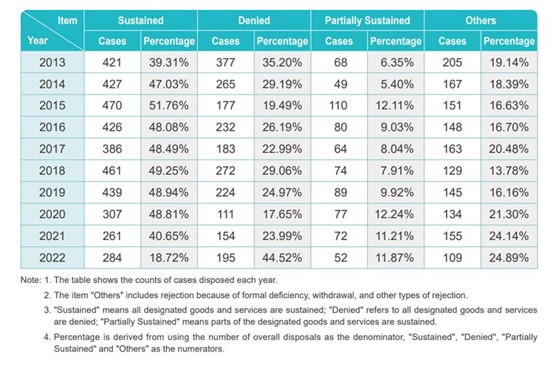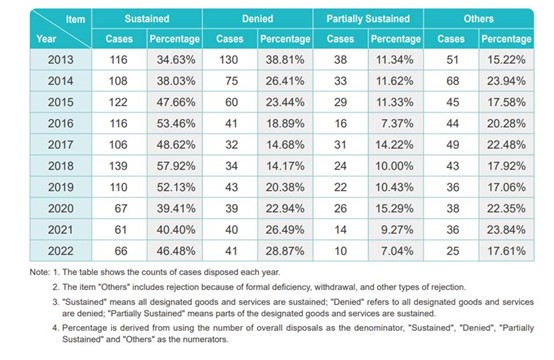Alternative methods to curb trademark squatting amid post-registration opposition abolition

The Taiwan Intellectual Property Office (TIPO) has proposed a draft amendment to the Trademark Act, which has been passed by the Executive Yuan and submitted to Taiwan’s Congress for deliberation. Once it is passed into law, opposition and invalidation will be consolidated into a single procedure. This means that the opposition system will be abolished and replaced by invalidation proceedings. However, there will be other ways to prevent trademark squatting when the amendment comes into force.
Currently, Taiwan has a post-registration opposition system. When a trademark application is approved for registration, it undergoes a three-month opposition period following publication. If no opposition is filed during this time, the registration is maintained and subject to potential invalidation, typically within five years.
According to TIPO’s Annual Report 2022, which was published on 30 June 2023, the statistics on trademark oppositions and invalidations are as follows.
Trademark opposition

Trademark invalidation

Changes to the Trademark Act
The draft amendment will bring about several significant changes concerning invalidation proceedings:
- The qualification and grounds for filing an invalidation action will be relaxed, so any party is entitled to file one based on any absolute non-registrable grounds stipulated in the Trademark Act.
- A Trademark Trial and Appeal Board (TTAB) will be set up within TIPO to examine invalidation cases on the basis of a complete adversary system and through oral hearings.
- When a party appeals the TTAB’s decision, it will be the opposition party rather than TIPO named as the defendant, and the appeal will be heard by the IP and Commercial Court. In contrast, under the current law, opposition and invalidation cases both start from TIPO, and there is a pre-court appellate agency called the Petitions and Appeals Committee of the Ministry of Economic Affairs that reviews appeals of TIPO’s rulings.
Modifications to the invalidation process
Under the current legal regime, the evidentiary requirements, costs involved and expected timelines are basically the same in invalidation and opposition actions, although the official fees payable in invalidation actions are higher (NTD$7,000 per class versus NTD$4,000 per class at the TIPO level). Both proceedings are inter partes and conducted on a pleading-and-defence basis; hearings are uncommon and not conducted as a general rule. The process can repeat until the parties have no further arguments or new evidence to file. Neither proceeding has discovery or specific evidentiary requirements. Unlike other countries, documentary evidence is not required to be filed along with the affidavit. The relevancy and admissibility of documentary evidence is determined on a case-by-case basis.
While it is hard to predict, it is generally believed that invalidation actions may be subject to a shorter timeline – with more clearly defined deadlines – after they are dealt with by the TTAB. Further, the removal of the Petitions and Appeals Committee from the appeal system suggests that parties might spend less time (and money) in the entire invalidation proceedings.
How opposition/invalidation actions will interact with infringement lawsuits
The IP and Commercial Court is the central forum for solving IP disputes and exercises both first-instance and appellate jurisdictions in terms of civil IP lawsuits.
If there is a pending trademark infringement suit, in which the defendant claims that the plaintiff’s trademark registration should be cancelled or revoked, TIPO can suspend an opposition/invalidation action pending the suit. Conversely, the IP and Commercial Court cannot suspend an infringement lawsuit pending the outcome of an opposition/invalidation action, but is empowered to review disputes on the validity of the alleged registration.
A new third-party submission process
Any party will be able to file an informal observation with TIPO before the examiner completes its analysis of the application. However, this is not a legal procedure and will not lead to a hearing. As such, the examiner is not obliged to reply to a third-party observation and has full discretion to decide whether to give weight to it. If the examiner does not find the observation persuasive and grants the trademark registration, this third party can still file an invalidation action against the trademark once it is registered.
It remains to be seen whether Taiwan’s Congress will modify the draft amendment.
WTR recommends
This is an Insight article, written by a selected partner as part of WTR's co-published content. Read more on Insight
Copyright © Law Business ResearchCompany Number: 03281866 VAT: GB 160 7529 10